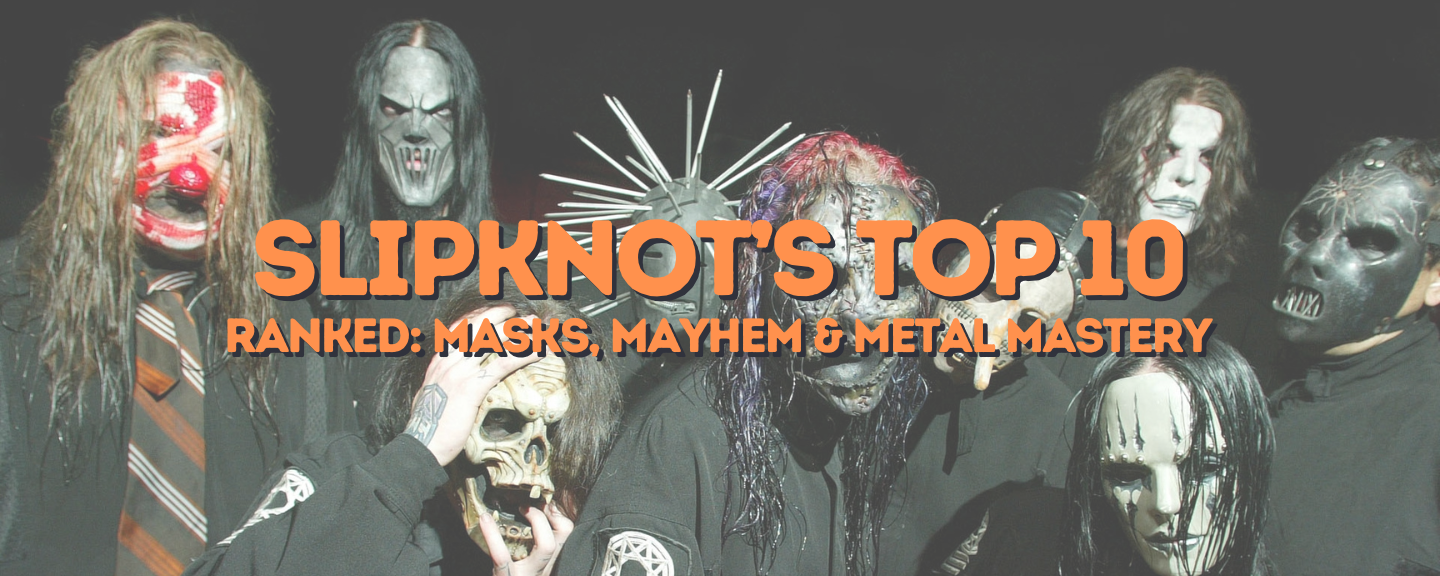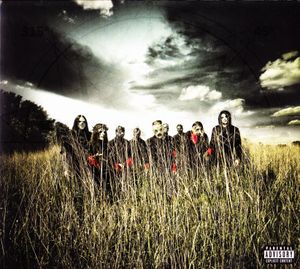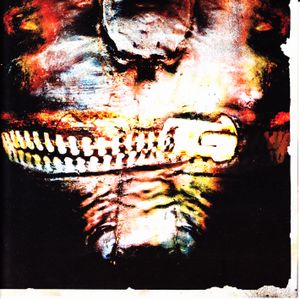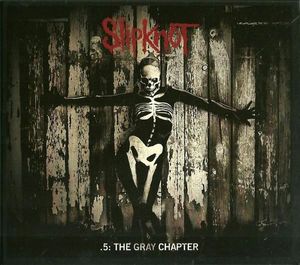
Slipknot’s Top 10
Listen on Spotify
Slipknot: A Heavy Metal Juggernaut
Slipknot, a name synonymous with intense, masked mayhem, emerged from the heartland of Des Moines, Iowa, in 1995. Born from the creative fire of percussionist Shawn "Clown" Crahan, former vocalist Anders Colsefni, and bassist Paul Gray, the band underwent a series of lineup changes before solidifying its nine-member core: Crahan, Gray, Joey Jordison, Craig Jones, Mick Thomson, Corey Taylor, Sid Wilson, Chris Fehn, and Jim Root. This lineup dominated the heavy metal scene for over a decade.
Slipknot's undeniable presence is built on their trademark image – masked, masked, and masked again – their aggressive musical style that blends heavy metal, thrash, and industrial influences, and their explosive live shows that leave audiences breathless. Their self-titled debut album in 1999 thrust them onto the world stage, instantly cementing their status as heavy metal royalty. The darker, heavier follow-up, Iowa in 2001, propelled them further into the spotlight.
After a brief hiatus, the band returned in 2004 with Vol. 3: (The Subliminal Verses), followed by another hiatus before their fourth album, All Hope Is Gone, topped the Billboard 200 chart in 2008. Another lengthy break culminated in the release of their fifth studio album, .5: The Gray Chapter, in 2014, marking a period of musical exploration and evolution.
Slipknot continued their reign with We Are Not Your Kind in 2019, a testament to their longevity and creative drive. Their latest offering, The End, So Far, hit the scene in 2022, showcasing the band's relentless commitment to pushing boundaries and delivering a sonic experience that's both brutal and captivating.
Slipknot remains a force to be reckoned with, a band that continues to redefine the heavy metal landscape, leaving a trail of sonic destruction and undeniable influence in its wake.
Nine masked maniacs, one pulverizing assault: Slipknot fuse break-neck percussion, down-tuned riffs, turntable scratches, and Corey Taylor’s throat-shredding roar into cathartic anthems of rage and release. From Iowa’s muddy fields to headlining the world’s biggest festivals, the band have turned trauma and nihilism into a visceral soundtrack for a generation that refuses to stay silent. The ten tracks below—presented from #10 to #1—trace Slipknot’s journey from underground shock value to mainstream metal dominance while capturing the raw emotion, technical prowess, and unfiltered honesty that keep the Knot Army forever loyal.
Selection Criteria
These songs were selected based on cultural impact, musical innovation, streaming popularity, and their significance in the band's discography.
The Top 3
Duality
Vol. 3: (The Subliminal Verses) • 2004From its iconic opening line—“I push my fingers into my eyes”—to its sledgehammer palm-muted riff, “Duality” encapsulates everything Slipknot do best: visceral confession, pummeling grooves, and an ear-worm chorus. Jordison’s cymbal chokes sync with keg hits, creating a percussive minefield that propels the momentum. The lyrics pulsate with self-inflicted pain as catharsis, turning personal torment into communal chant. Its infamous house-wrecking video captured real fans tearing down a suburban home alongside the band, immortalizing Slipknot’s bond with their audience. Commercially triumphant yet uncompromising, “Duality” reigns as the definitive Slipknot track—an unholy fusion of melody and mayhem that continues to ignite crowds around the globe.
Psychosocial
All Hope Is Gone • 2008A thunderous triplet riff and tribal tom groove kick off Slipknot’s quintessential arena anthem. Root’s and Thomson’s harmonized bends slice through the mix, while Chris Fehn and Shawn Crahan’s percussion battalion layers metallic clangs underneath. Taylor’s hook-laden chorus—“And the rain will kill us all”—turns apocalyptic dread into fist-pumping unity. The molten-lava video further etched the song into metal lore, amassing hundreds of millions of streams and becoming a gateway track for new maggots worldwide.
Wait and Bleed
Slipknot • 1999Clocking in under three minutes, “Wait and Bleed” packs feral energy into a radio-ready frame. Clean, eerie verses explode into screamed choruses over razor-sharp riffs, with Craig Jones’s samples sprinkling cinematic menace. Jordison’s lightning-quick snare rolls keep tension coiled throughout. The lyrics depict a psychotic break in chilling first-person detail—“I’ve felt the hate rise up in me.” Slipknot’s first major single, it cracked mainstream charts and earned a Grammy nomination, showing the world that unfiltered aggression could coexist with catchy songwriting.
Honorable Mentions
The Devil in I
Slipknot’s first major single after Jordison’s departure and Paul Gray’s passing, “The Devil in I” pairs dirge-like verses with an anthemic chorus, reflecting grief and rebirth. New drummer Jay Weinberg mirrors Jordison’s technical flair while injecting fresh swing, and Alessandro Venturella’s bass throbs with ominous presence. Taylor’s introspective lyrics wrestle with inner demons—“Step inside, see the Devil in I”—acknowledging personal flaws while refusing defeat. The song’s balance of melody and menace introduced a renewed Slipknot to a new generation, proving the band could evolve without losing their soul.
Before I Forget
Here Slipknot harness complex rhythms without sacrificing accessibility. Jordison offsets a 4/4 stomp with ghost-note hi-hat flourishes, while the guitars drop into syncopated chugs that stop on a dime. A clean, melodic chorus showcases Taylor’s dynamic range, bridging radio-friendly hooks with uncompromising heaviness. The lyrics celebrate self-identity forged in adversity—“I am a world before I am a man.” Winning the 2006 Grammy for Best Metal Performance, the track proved Slipknot could conquer mainstream accolades on their own abrasive terms, expanding their global reach without diluting their core intensity.
Surfacing
From the debut album, “Surfacing” is equal parts nu-metal groove and death-metal vitriol. Thomson’s pick-scrapes segue into a seismic riff, while DJ scratches and keg smashes add industrial edge. The breakdown’s dissonant harmonics feel like sheets of rusty metal tearing apart. Taylor’s profanity-laced lyrics disown societal expectations—“Fuck you all!”—turning self-loathing outward with primal fury. As an early concert closer, it cemented Slipknot’s reputation for controlled chaos, with masks flying and sweat-drenched mosh pits proving the band could channel raw emotion into communal release.
The Heretic Anthem
“666!” Taylor snarls over a churning chromatic riff, as if summoning a metal exorcism. The song’s staccato verses ride Jordison’s machine-gun double-kick patterns, while Root and Thomson sync up on chromatic slides that emulate sirens. Lyrically, it flips critics’ disdain into a badge of honor—“If you’re 555, then I’m 666.” The bridge’s call-and-response gang shouts turn arenas into riotous choirs, reinforcing Slipknot’s us-against-the-world ethos. “Heretic” crystallizes the band’s refusal to conform, making it a rallying cry for metal outsiders everywhere.
People = Shit
A torrent of blast beats, whammy-dive riffs, and sampler sirens detonates within seconds, declaring Iowa’s mission statement: utter extremity. Jordison’s relentless tempo shifts and Sid Wilson’s vinyl screeches form a chaotic backdrop for Taylor’s nihilistic mantra. Beyond pure aggression, the track channels real-world alienation and anger, turning misanthropy into a unifying chant for fans who feel equally marginalized. The title remains a blunt provocation, yet the song’s tight structure and unforgettable hook ensure it transcends shock value to become a cathartic live staple.
Sulfur
Launching with a syncopated riff and Joey Jordison’s hurricane double-kick work, “Sulfur” captures All Hope Is Gone’s balance of technicality and groove. Mick Thomson and Jim Root weave harmonized slides and chromatic runs that feel both slithery and crushing. The lyrics dissect corrosive hypocrisy—“I’ll never kill myself to save my soul”—while Taylor toggles between venomous screams and soaring cleans. A sleek, orange-lit video underscored the combustible metaphor, cementing “Sulfur” as a fan-favorite deep cut that showcases Slipknot’s maturing songcraft without dulling the blade.

Snuff
A lone acoustic guitar and Taylor’s fragile croon reveal Slipknot’s seldom-heard vulnerability. Gradually, layers of distorted chords and orchestral swells envelop the track, transforming personal heartbreak into a cinematic crescendo. The restrained drumming and minor-key melodies amplify the emotional gravity without ever resorting to blast-beat theatrics. Lyrically, “Snuff” reads like a tear-stained farewell letter, grappling with betrayal and self-destruction. Its stripped-down sincerity proved Slipknot could devastate without masks or mayhem, resonating deeply with fans who found solace in the band’s softer shadows. The song’s massive streaming numbers attest to its status as the ultimate curveball in an otherwise brutal catalog.
Final Thoughts
This ranking represents the pinnacle of Slipknot’s Top 10 artistic achievement. Each song has earned its place through a combination of cultural impact, musical innovation, and enduring popularity.
Cultural Impact
Songs that shaped music history and influenced countless artists
Fan Favorites
Tracks with millions of streams and lasting popularity across generations
Watch Related Video
Last Updated: 5/15/2025




